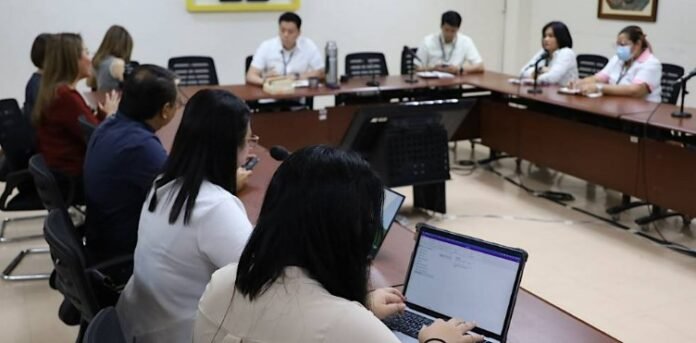MANILA, Philippines — On Thursday, Senator Sherwin Gatchalian announced that the production of textbooks for students in the initial stage of the adjusted “K to 10” curriculum is set to conclude by July.
As the chair of the Senate basic education committee, Gatchalian revealed that approximately seven to eight million textbooks are slated to be printed for students in the upcoming school year (SY) 2024 to 2025, aligning with the Department of Education’s (DepEd) “Matatag” curriculum, which will commence in August.
“In anticipation of the forthcoming school year, new textbooks will be readily available before July, by their established timeline,” Gatchalian shared during an online interview with reporters.
In a statement on Thursday, Senator Sherwin Gatchalian revealed that the printing of textbooks for students in the initial phase of the recalibrated “K to 10” curriculum is expected to be completed by July. As the head of the Senate basic education committee, Gatchalian highlighted the production of approximately seven to eight million textbooks for students during the upcoming school year (SY) 2024 to 2025, aligning with the Department of Education’s (DepEd) “Matatag” curriculum set to commence in August.
During an online interview with reporters, Gatchalian assured that there will be new textbooks before July, as per the outlined timeline of the DepEd. However, he acknowledged the tight schedule, expressing concern about potential delays.
“While we anticipate the release of new textbooks before July based on their timeline, we must acknowledge that the schedule is currently under significant pressure. Our analysis indicates a very tight timeline, and any delay, given the complexity of the DepEd’s multiple departments, could lead to a setback,” Gatchalian stated.
The senator, who also co-chairs the Second Congressional Commission on Education, emphasized the need for meticulous planning to ensure the timely distribution of educational materials and the smooth implementation of the updated curriculum.
(Considering the evaluation, the schedule is quite stringent, and any potential setback in a department, considering the numerous departments within the DepEd, could result in a delay for the entire project.)
However, Gatchalian emphasized the importance for the Department of Education (DepEd) to prioritize the completion of textbook printing. Failing to do so could result in the continued use of outdated modules, ultimately undermining the objectives of the new curriculum.
“If there is a delay, the interim solution would involve utilizing the outdated self-learning modules. However, in my perspective, this undermines the essence of the new curriculum,” expressed Gatchalian.
Senator Sherwin Gatchalian announced on Thursday that the printing of textbooks for students in the initial phase of the revised “K to 10” curriculum is slated to be completed by July. As the chair of the Senate basic education committee, Gatchalian disclosed that around seven to eight million textbooks are set to be printed for the academic year 2024 to 2025, aligning with the Department of Education’s (DepEd) “Matatag” curriculum, which kicks off in August.
Gatchalian assured reporters in an online interview that new textbooks would be available before July based on the established timeline. However, he acknowledged the tight schedule, emphasizing that any delay within the multifaceted structure of the DepEd could potentially disrupt the entire process.
“Based on our analysis, the timeline is indeed very tight, and if there’s even a minor delay – you know how the DepEd operates with its various departments – it could result in a significant setback,” Gatchalian remarked.
Despite the challenges, Gatchalian urged the DepEd to prioritize the timely completion of textbook printing, expressing concern that any delay might force students to resort to using outdated modules, thereby undermining the objectives of the new curriculum.
“We launched this new curriculum to enhance learner outcomes and improve learner performance. But without books, how will children learn?” Gatchalian questioned.
The Matatag curriculum, designed to address the “learning crisis” in the education sector, focuses on five foundational skills from Kindergarten to Grade 10: language, reading and literacy, mathematics, makabansa, and good manners and right conduct. This marks a departure from the current curriculum’s seven learning areas, which include mother tongue, Filipino, English, Mathematics, Araling Panlipunan, Mapeh, and Edukasyon sa Pagpapakatao.
The phased implementation of the Matatag Curriculum is structured as follows: the first phase (SY 2024 to 2025) for Kinder, Grade 1, Grade 4, and Grade 7; the second phase (SY 2025 to 2026) for Grade 2, Grade 5, and Grade 8; the third phase (SY 2026 to 2027) for Grade 3, Grade 6, and Grade 9; and the final phase for Grade 10 during SY 2027 to 2028.
The recalibration of the curriculum is a response to the “learning crisis” highlighted by Edcom II on its website. The World Bank’s 2022 report on the State of Global Learning Poverty reveals that the Philippines ranks among the highest in the Asian region, with learning poverty at 90.9 percent.




